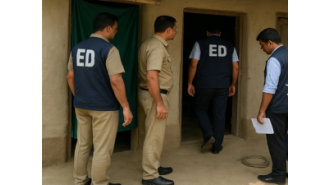Courts Appoint Special Counsel to Oversee Reform of New York’s Troubled Guardianship System
One recent Supreme Court decision is already rippling through dozens of key lower court cases involving everything from airline fees to gun sales to abortion access, affecting people’s lives in important — and sometimes contradictory — ways.

New York’s top judicial leaders are moving to reform the state’s troubled guardianship system after a ProPublica investigation found lax monitoring allowed court appointees to abuse and neglect the elderly and infirm New Yorkers they were supposed to protect.
The renewed attention will come from two newly created positions in the state court system: a special counsel for guardianship matters and elder justice, who, according to a spokesperson, will focus on “reform efforts of the statewide adult guardianship system”; and a so-called statewide coordinating judge.
More than 28,000 New Yorkers are under the care of court-appointed guardians, charged with managing the affairs of people deemed incapable of caring for themselves. Under state law, guardians can control their wards’ finances and health care and are paid for their services from their charges’ funds. But as ProPublica reported this year, court oversight of these officials is threadbare. In New York City, for example, there are just over a dozen judges and 157 court examiners responsible for overseeing the guardians and ensuring the welfare of 17,411 people.
Advocates say those most vulnerable to abuse and neglect are the so-called unbefriended — the New Yorkers who have no friends or family able to look after them. An internal court assessment obtained by ProPublica estimated that they account for 20% of all wards statewide. No single government agency provides for their care. The courts have long relied on a small network of nonprofits and professional guardians for these low- and no-fee cases.
The shallow pool of providers, coupled with too few court examiners to oversee guardians’ work, has led to neglect, exploitation and abuse. A woman featured in ProPublica’s reporting lived for years in a home that had no heat and was infested with bedbugs and rats — conditions her legally appointed guardian did not rectify and her examiner did not question. Another guardian spent more than half of her ward’s life savings for care provided by her own private business — a flagrant conflict of interest that a judge permitted for years.
After ProPublica sent questions about that guardian’s conduct to the court system, a court spokesperson said an inspector general had opened an investigation into the allegations. The spokesperson didn’t provide any further details.
The court system’s actions come as advocates press local and state officials to buoy the guardianship system that they say cannot keep pace with the demand for services, especially among the elderly, which is the fastest-growing age group in the state. Advocates told lawmakers at a New York City Council hearing on elder fraud last week that the current arrangement is unsustainable.
Highlights From This Series
“The chronic lack of available guardians has created an untenable situation,” testified Jean Callahan, who chairs a group of judges, lawyers and others involved in the guardianship system called the Working Interdisciplinary Networks of Guardianship Stakeholders, or WINGS. “We’ve created an unfunded mandate in New York.”
Callahan was among a half dozen professionals who urged the City Council to pass a resolution calling on state leaders to create a publicly funded system. The bill’s author, City Councilmember Crystal Hudson, drafted the measure in response to ProPublica’s reporting. “Now is the time for Gov. [Kathy] Hochul to take action, to strengthen our guardianship system by instituting a public fund to compensate guardians in order to safeguard vulnerable New Yorkers in need of protective arrangements,” Hudson said during the hearing.
Her bill endorses a $15 million annual appropriation that would support a network of nonprofits that cater to the poorest of the unbefriended. Guardianship Access New York, a coalition of nonprofits that drafted the proposal, sent a letter last week to Hochul and other top state officials urging them to fund the initiative, which is supported by roughly two dozen community groups, including AARP New York.
Another plan, suggested by an advisory committee to the state court system, goes much further. It proposes creating an independent statewide agency to serve as a guardian for those who have nobody else, an endeavor that the group estimates would cost $72 million annually to staff.
State Sen. Cordell Cleare, who chairs her chamber’s Committee on Aging, said in an interview that she supports overhauling the guardianship system, and she has endorsed the more modest proposal to help nonprofits care for the unbefriended statewide. “From everything I’ve looked at and weighed, I think it’s the right thing to do,” she said.
But it’s not clear whether Hochul and the state’s legislatives leaders agree. While they’ve acknowledged the need to care for the state’s growing aging population, none have specifically commented on the problems in guardianship highlighted by ProPublica or advocates’ proposed fixes. Any reform efforts would go through the Senate and Assembly judiciary committees, but neither chair responded to requests for comment for this story.
In a statement, a spokesperson for the governor said Hochul will review budget proposals “in January, as required by law.”
Do You Have a Tip for ProPublica? Help Us Do Journalism.
Got a story we should hear? Are you down to be a background source on a story about your community, your schools or your workplace? Get in touch.
ProPublica is a nonprofit newsroom that investigates abuses of power. Sign up to receive our biggest stories as soon as they’re published.
ProPublica is a nonprofit newsroom that investigates abuses of power. Sign up to receive our biggest stories as soon as they’re published.







